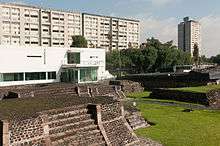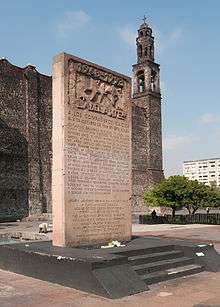Plaza de las Tres Culturas
Coordinates: 19°27′4″N 99°08′14″W / 19.45111°N 99.13722°W

The Plaza de las Tres Culturas ("Square of the Three Cultures") is the main square within the Tlatelolco neighbourhood of Mexico City. The name "Three Cultures" is in recognition of the three periods of Mexican history reflected by buildings in the plaza: pre-Columbian, Spanish colonial, and the independent "mestizo" nation. The plaza, designed by Mexican architect and urbanist Mario Pani, was completed in 1966.[1][2]

The square contains the remains of Aztec temples and is flanked by the Catholic church of Santiago de Tlatelolco[3] (built between 1604 and 1610 by fray Juan de Torquemada[4][5]) and by a massive housing complex built in 1964.
The former headquarters of the Secretariat of Foreign Affairs (foreign ministry) also stands on the southern edge of the square. This headquarters now houses a memorial museum called "Memorial 68", opened by UNAM in October 2007,[6] to remember the 1968 Mexican student demonstrations and the Tlatelolco Massacre victims and survivors.[5][7] On the south side of the Plaza stands a large stone memorial erected on October 2, 1993, the 25th anniversary of the massacre, in memory of the hundreds killed.[8]
See also
- Unidad Habitacional Nonoalco-Tlatelolco
- Memorial del 68 (Spanish Wikipedia)Google translation
References
- ↑ Michael J. Lazzara; Vicky Unruh (2009). Telling Ruins in Latin America. Macmillan. pp. 108–111. ISBN 0-230-60522-2.
- ↑ Theis, Klaus. "Plaza of Three Cultures, Much Pain". Retrieved 2 October 2010.
- ↑ "Mexico City - Santiago de Tlatelolco". planetware.com. Retrieved 2 October 2010.
- ↑ "Plaza de las Tres Culturas". Frommers. Retrieved 2 October 2010.; for the role of Torquemada, see his Monarquía indiana, Lib. XVII, cap. 5
- 1 2 DeLange, George & Audrey. "Plaza de las Tres Culturas". Retrieved 2 October 2010.
- ↑ Arroyo, Sergio Raúl. "Mexico:The Power of Memory". Bulletin Supplement 6 (2009). German Historical Institute. p. 53. Retrieved 2 October 2010.
Arroyo is the Director of CCUT, which houses the museum. - ↑ hotelplanner.com
- ↑ Doyle, Kate. "The Dead of Tlatelolco". National Security Archive. Retrieved 2 October 2010.